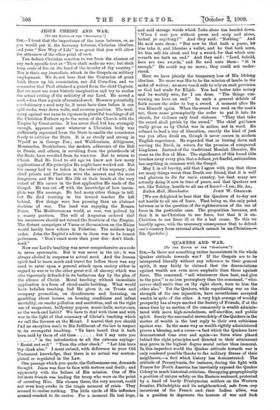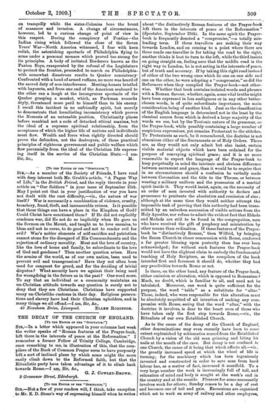QUAKERS AND WAR.
[TO THE EDITOR OP THE " SPECTATOR:1
Snt,—Is there not something rather inconsistent in the whole Quaker attitude towards war ? If the Gospels are to be interpreted literally without any reference to their general spirit, it may fairly be claimed that the denunciations against wealth are even more emphatic than those against force. The command, "sell whatsoever thou haat, and give to the poor," is no less peremptory than the command, "who- soever shall smite thee on thy right cheek, turn to him the other also." Yet the Quakers, while repudiating war on the strength of the one injunction, have nevertheless accepted wealth in spite of the other. A very high average of worldly prosperity has always marked the Society of Friends, if at the same time by no section of the community is wealth adminis- tered with more high-mindedness, self-sacrifice, and publics spirit. Surely the successful stewardship of the Quakers bathe matter of wealth is the best reply to their own criticisms against war. In the same way as wealth rightly administered proves a blessing, not a curse—a fact which the Quakers have demonstrated time over and again—so force when placed behind the right principles and directed to their attainment may prove in the highest degree moral rather than immoral. In this imperfect world the Quaker attitude towards war is only rendered possible thanks to the military fitness of their neighbours,—a fact which history has demonstrated. The attitude of Pennsylvania, for instance, during the fight with France for North America has inevitably exposed the Quaker Colony to much historical criticism. Occupying geographically a position of unique safety on the Eastern seaboard, protected by a band of hardy Presbyterian settlers on the Western frontier, Philadelphia and its neighbourhood, safe from any incursions of the French and their Indian allies, was in a position to deprecate the horrors of war and look
on tranquilly while the sister-Colonies bore the brunt of massacre and invasion. A change of circumstances, however, led to a curious change of point of view in this respect. During the conspiracy of Pontiac—the Indian rising which followed the close of the Seven Years' War—North America witnessed, I fear with keen relish, the astonishing spectacle of Philadelphia flying to arms under a personal menace which proved too strong for its principles. A body of irritated Borderers known as the Paxton Boys, exasperated by the refusal of the Legislature to protect the frontier, proceeded to march on Philadelphia, with somewhat disastrous results to Quaker consistency Confronted with a band of armed ruffians, no more was heard of the sacred duty of non-interference. Meeting-houses bristled with bayonets, and from one end of the American seaboard to the other ran a laugh at the incongruous spectacle of the Quaker grasping a musket, which, as Parkman remarks dryly, threatened more peril to himself than to his enemy. I recall this incident in no unfriendly spirit, but merely to demonstrate that humiliating inconsistency which proves the Nemesis of an untenable position. Christianity places before mankind not a code of detached ethical maxims, but the ideal of a supreme spiritual relationship, from the acceptance of which the higher life of nations and individuals must flow. Wealth and force when rightly directed should prove the defenders, not the destroyers, of those practical principles of righteous government and public welfare which flow perennially from the ideal of the Christian life express- ing itself in the service of the Christian State.—I am, Sir, &c.,



























































 Previous page
Previous page